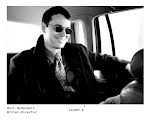William Christie is in America's opera eye now,
because he is making his Metropolitan Opera debut
with Mozart's Cosi Fan Tutte.
He has conducted Mozart before, but he is better
known for his conducting of early opera, notably
for his conducting of the music of Claudio Monteverdi,
the composer who breathed life into the form.
The Les Arts Florissants production of Monteverdi's
Il ritorno d'Ulisse in patria*, conducted by William
Christie is the greatest operatic video production
I know of for any composer's work. I should make it
clear I am not making this claim based on the vocal
quality of the singers - which is very high - but from
the viewpoint of effective theater.
The Ritorno is perhaps the most neglected opera
in the repertory. It does not have the popularity of
Monteverdi's first opera, Orfeo, or the cache of
his final one, Poppea. I would compare it
storywise to a film noir of the late 1940s or early
50s such as Out of the Past.
To see the Ritorno, especially its stunning four
part duet finale, is to realize that opera could
have gone in a very different direction if the
music had not come to mean so much more
than the acting and the story, and especially
if the da capo aria had not come to dominate
the expression of emotion from the time of
Handel on.
To my unscholared mind, Handel's genius
forced opera away from to theater to the concert
hall. Compare his operas to Dido and Aeneas,
the last opera in the Monteverdian tradition still
performed today, and you can see how much
more direct and theatrical Purcell's opera is
than any of Handel's.
Given the Ritorno's neglected status and the general
dearth of early operas in performance,
Christie's production, admirably directed for
the stage by Adrian Noble of the Royal
Shakespeare Company, is especially important
as it shows the way to present this early music
with power and vitality.
I am linking to the finale. It starts with
Penelope's song of joy at Ulisses's return
follows through a more meditative passage
and back into joy before quieting down
like Joyce's Ulysses into the word, "yes"
as its final word. Monteverdi's is a much more
flexible way to express the changing emotions
of the human heart than the da capo aria,
which sacrifices complexity for hummability.
Monteverdi's sensibility is also much more modern
than traditional opera's. Yes, today our sensibility
is closer to Monteverdi's of 1640 than Puccini's a
hundred years ago. As William Christie said, an
audience comes out of a good production of
Monteverdi not only moved but also "bewildered
by the modernity".
*The production in question is Les Arts Florissants
first video production filmed in July 2002. There
is a very recent production of which I have only seen
excerpts.
Subscribe to:
Post Comments (Atom)

No comments:
Post a Comment